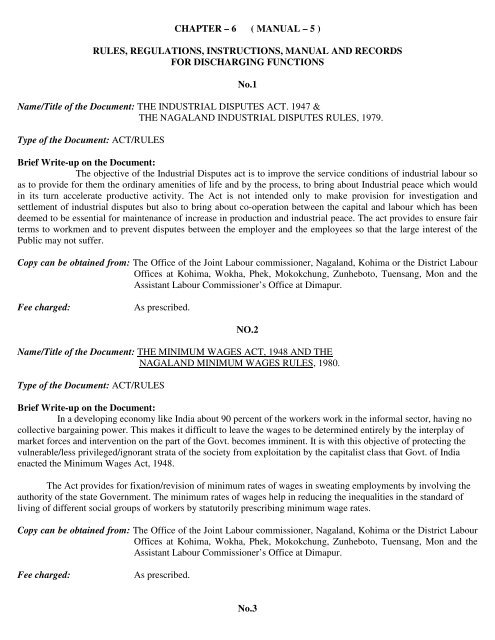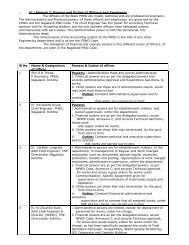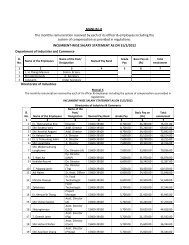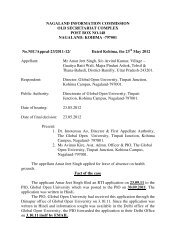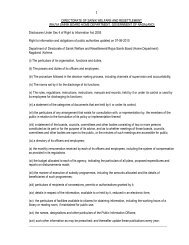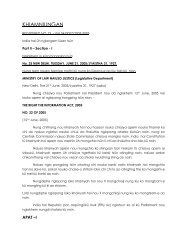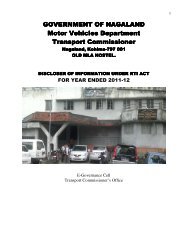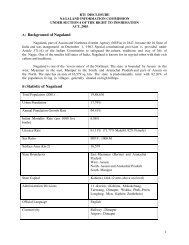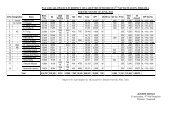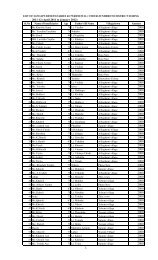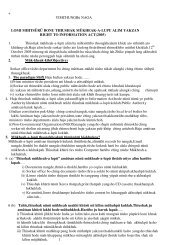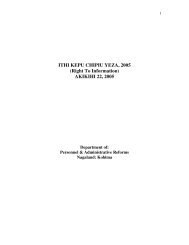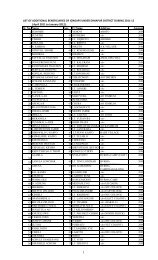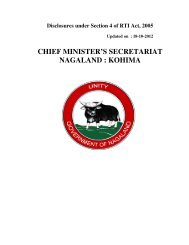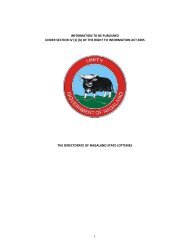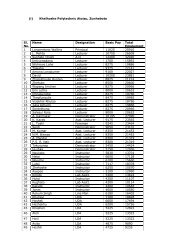CHAPTER – 6 ( MANUAL – 5 ) - Nagaland State Information ...
CHAPTER – 6 ( MANUAL – 5 ) - Nagaland State Information ...
CHAPTER – 6 ( MANUAL – 5 ) - Nagaland State Information ...
You also want an ePaper? Increase the reach of your titles
YUMPU automatically turns print PDFs into web optimized ePapers that Google loves.
<strong>CHAPTER</strong> <strong>–</strong> 6 ( <strong>MANUAL</strong> <strong>–</strong> 5 )<br />
RULES, REGULATIONS, INSTRUCTIONS, <strong>MANUAL</strong> AND RECORDS<br />
FOR DISCHARGING FUNCTIONS<br />
No.1<br />
Name/Title of the Document: THE INDUSTRIAL DISPUTES ACT. 1947 &<br />
THE NAGALAND INDUSTRIAL DISPUTES RULES, 1979.<br />
Type of the Document: ACT/RULES<br />
Brief Write-up on the Document:<br />
The objective of the Industrial Disputes act is to improve the service conditions of industrial labour so<br />
as to provide for them the ordinary amenities of life and by the process, to bring about Industrial peace which would<br />
in its turn accelerate productive activity. The Act is not intended only to make provision for investigation and<br />
settlement of industrial disputes but also to bring about co-operation between the capital and labour which has been<br />
deemed to be essential for maintenance of increase in production and industrial peace. The act provides to ensure fair<br />
terms to workmen and to prevent disputes between the employer and the employees so that the large interest of the<br />
Public may not suffer.<br />
Copy can be obtained from: The Office of the Joint Labour commissioner, <strong>Nagaland</strong>, Kohima or the District Labour<br />
Offices at Kohima, Wokha, Phek, Mokokchung, Zunheboto, Tuensang, Mon and the<br />
Assistant Labour Commissioner’s Office at Dimapur.<br />
Fee charged: As prescribed.<br />
NO.2<br />
Name/Title of the Document: THE MINIMUM WAGES ACT, 1948 AND THE<br />
NAGALAND MINIMUM WAGES RULES, 1980.<br />
Type of the Document: ACT/RULES<br />
Brief Write-up on the Document:<br />
In a developing economy like India about 90 percent of the workers work in the informal sector, having no<br />
collective bargaining power. This makes it difficult to leave the wages to be determined entirely by the interplay of<br />
market forces and intervention on the part of the Govt. becomes imminent. It is with this objective of protecting the<br />
vulnerable/less privileged/ignorant strata of the society from exploitation by the capitalist class that Govt. of India<br />
enacted the Minimum Wages Act, 1948.<br />
The Act provides for fixation/revision of minimum rates of wages in sweating employments by involving the<br />
authority of the state Government. The minimum rates of wages help in reducing the inequalities in the standard of<br />
living of different social groups of workers by statutorily prescribing minimum wage rates.<br />
Copy can be obtained from: The Office of the Joint Labour commissioner, <strong>Nagaland</strong>, Kohima or the District Labour<br />
Offices at Kohima, Wokha, Phek, Mokokchung, Zunheboto, Tuensang, Mon and the<br />
Assistant Labour Commissioner’s Office at Dimapur.<br />
Fee charged: As prescribed.<br />
No.3
Name/Title of the document: THE PAYMENT OF WAGES ACT, 1936 AND<br />
THE NAGALAND PAYMENT OF WAGES RULES, 1980.<br />
Type of the Document: ACT/RULES<br />
Briefs Write-up on the Document:<br />
The Payment of Wages Act regulates the payment of wages to certain classes of persons in Industry and its<br />
importance cannot be under <strong>–</strong> estimated. The Act not only guarantees payment of wages in time and without<br />
deductions except those authorized under the Act. The Act provides for the responsibility for payment of wages,<br />
fixation of wage period, time and mode of payment of wages and also for a machinery to hear and decide complaints<br />
regarding the deduction from wages or in delay in payment of wages and penalty for malicious and vexations claims.<br />
Copy can be obtained from: The Office of the Joint Labour commissioner, <strong>Nagaland</strong>, Kohima or the District Labour<br />
Offices at Kohima, Wokha, Phek, Mokokchung, Zunheboto, Tuensang, Mon and the<br />
Assistant Labour Commissioner’s Office at Dimapur.<br />
Fee charged: As prescribed.<br />
No.4<br />
Name/Title of the Document: THE PAYMENT OF GRATUITY ACT, 1972 AND<br />
THE NAGALAND PAYMENT OF GRATUITY RULES, 1978.<br />
Type of the Document: ACT/RULES<br />
Brief Write <strong>–</strong> up on the Document:<br />
The object of the Payment of Gratuity Act was to improve and give the stability to the services rendered by<br />
workman and employee engaged in shops, factories and other establishments and for matters connected therewith.<br />
General features of the Act are that gratuity is to be paid to the employees, the mode of payment, its amount and<br />
calculation and a controlling authority who will be responsible to implement the provisions of Act. Provisions of<br />
compulsory insurance for liability of the employer to make payments towards gratuity, nomination by employees, and<br />
recovery of gratuity are made in the Act.<br />
Copy can be obtained from: The Office of the Joint Labour commissioner, <strong>Nagaland</strong>, Kohima or the District Labour<br />
Offices at Kohima, Wokha, Phek, Mokokchung, Zunheboto, Tuensang, Mon and the<br />
Assistant Labour Commissioner’s Office at Dimapur.<br />
Fee charged: As prescribed.<br />
NO.5<br />
Name/Title of the Document: THE PAYMENT OF BONUS ACT, 1965 AND<br />
Type of document: ACT/RULES.<br />
Brief Write-up on the Document:<br />
THE PAYMENT OF BONUS RULES.<br />
The payment of Bonus Act, 1965 was enacted to provide for the bonus to persons employed in Factories and<br />
to every other establishment in which 20 or more persons are employed on a day during an accountable year. It also<br />
deals with matters connected with bonus of employees. The Act prescribes eligibility of persons to receive bonus,<br />
their disqualification for the same, time limit for its payment and the application of provisions to certain cases in<br />
establishment of public sector. The Act provides for auditing accounts, inspections and maintenance of records.<br />
Copy can be obtained from: The Office of the Joint Labour commissioner, <strong>Nagaland</strong>, Kohima or the District Labour<br />
Offices at Kohima, Wokha, Phek, Mokokchung, Zunheboto, Tuensang, Mon and the<br />
Assistant Labour Commissioner’s Office at Dimapur.
Fee charged: As prescribed.<br />
NO.6<br />
Name/Title of the Document: THE TRADE UNIONS ACT, 1926 AND<br />
Type of the Document: ACT/REGULATIONS<br />
Brief write-up on the document:<br />
THE NAGALAND TRADE UNIONS REGULATIONS 1980<br />
The purpose of the Trade Unions Act was to give the Trade Unions a legal status. The constitution of India<br />
recognizes the right of a citizen to form a Union since the right to form and continue a Trade Union is a fundamental<br />
right guaranteed under Article 19 (1) (C) of the Constitution of India. It can only be subjected to reasonable restriction<br />
in the public interest as provided by Article 19 (1) (6) of the Constitution. Provision is also made in the Trade Unions<br />
Act, in order to operate as a trade Union.<br />
Copy can be obtained from: The Office of the Joint Labour commissioner, <strong>Nagaland</strong>, Kohima or the District Labour<br />
Offices at Kohima, Wokha, Phek, Mokokchung, Zunheboto, Tuensang, Mon and the<br />
Assistant Labour Commissioner’s Office at Dimapur.<br />
Fee charged: As prescribed.<br />
NO. 7<br />
Name/Title of the Document: THE INDUSTRIAL EMPLOYMENT (STANDING ORDERS) ACT, 1946 AND<br />
Type of the Document: ACT/RULES<br />
Brief write up on the document:<br />
THE NAGALAND INDUSTRIAL EMPLOYMENT (S O) RULES, 1978.<br />
The Industrial Employment (Standing Orders) Act, 1946 aims at having uniform standing orders providing for<br />
the matters enumerated in the schedule to the Act, that there should not be different conditions of service for those<br />
who are employed before and those employed after the standing orders came into force. They bind all those presently<br />
in the employment of the concerned establishment as well as those who are appointed thereafter.<br />
Copy can be obtained from: The Office of the Joint Labour commissioner, <strong>Nagaland</strong>, Kohima or the District Labour<br />
Offices at Kohima, Wokha, Phek, Mokokchung, Zunheboto, Tuensang, Mon and the<br />
Assistant Labour Commissioner’s Office at Dimapur.<br />
Fee charged: As prescribed.<br />
NO.8<br />
Name/Title of the Document: THE NAGALAND SHOPS & ESTABLISHMENTS ACT, 1986<br />
Type of the Document: ACT/RULES<br />
Brief Write <strong>–</strong> up on the Document:<br />
& THE NAGALAND SHOPS & ESTABLISHMENTS RULES.
The Shops and Establishments Act is a <strong>State</strong> Legislation and almost every <strong>State</strong>/Union Territory Government<br />
has enacted its Shops and Establishments Act and has framed rules for its enforcement.<br />
The Act provides for regulation of conditions of work and employment in shops and commercial<br />
establishments / establishments for public entertainment or amusement such as Hours of work, Leave, Wages,<br />
Employment of Children and Women, Health & Safety and Offences, Penalties and Procedures. The Act provides that<br />
every employer shall be obligated to register his Shops and Establishments. The registration shall be renewed every<br />
twelve months. On any registration or renewal of Shops and Establishments, a Certificate shall be issued to the<br />
employers by the Chief Inspector of Shops & Establishment or by persons entrusted by him for such matters.<br />
Copy can be obtained from: The Office of the Joint Labour commissioner, <strong>Nagaland</strong>, Kohima or the District Labour<br />
Offices at Kohima, Wokha, Phek, Mokokchung, Zunheboto, Tuensang, Mon and the<br />
Assistant Labour Commissioner’s Office at Dimapur.<br />
Fee charged: As prescribed.<br />
NO.9<br />
Name/Title of the Document: THE INTER <strong>–</strong> STATE MIGRANT WORKMEN (REGULATIONS OF<br />
EMPLOYMENT AND CONDITIONS OF SERVICE) AND ITS RULES.<br />
Type of the Document: ACT/RULES<br />
Brief write <strong>–</strong> up on the document:<br />
The Inter <strong>–</strong> <strong>State</strong> Migrant workmen (Regulation of Employment and conditions of service) Act. 1979 is<br />
intended to safeguard the interests of the workmen who are recruited by contractors from one <strong>State</strong> for service in an<br />
establishment situated in another <strong>State</strong> and to guard against the exploitation of such workmen by the contractors.<br />
Copy can be obtained from: The Office of the Joint Labour commissioner, <strong>Nagaland</strong>, Kohima or the District Labour<br />
Offices at Kohima, Wokha, Phek, Mokokchung, Zunheboto, Tuensang, Mon and the<br />
Assistant Labour Commissioner’s Office at Dimapur.<br />
Fee charged: As prescribed.<br />
NO.10<br />
Name/Title of the Document: THE CHILD LABOUR (PROHIBITION AND<br />
REGULATION) ACT, 1986 AND THE RULES<br />
Type of the Document: ACT/RULES<br />
Brief write <strong>–</strong> up on the document:<br />
This Act provides that no child under the age of 14 (fourteen) years would be allowed to work for livelihood<br />
and should be given free education. The main object of the Act is to prohibit the engagement of children in certain<br />
employments and to regulate the conditions of work of children in certain other employments. The Act envisages that<br />
no child shall be employed or permitted to work in any of the occupations set forth in part A and B of the Schedule to<br />
the Act.<br />
The Act provided that no child shall be permitted or required to work between 7 P.M. and 8 A.M. The period<br />
of work on each day shall be as fixed that no period shall exceed three hours and that no child shall work for more<br />
than 3 hours before he has had an interval for rest for at least one hour. The Act also provides for the health and safety<br />
of the children.<br />
Copy can be obtained from: The Office of the Joint Labour commissioner, <strong>Nagaland</strong>, Kohima or the District Labour<br />
Offices at Kohima, Wokha, Phek, Mokokchung, Zunheboto, Tuensang, Mon and the<br />
Assistant Labour Commissioner’s Office at Dimapur.
Fee charged: As prescribed.<br />
NO.11<br />
Name/Title of the Document: THE BONDED LABOUR SYSTEM (ABOLITION) ACT, 1976 AND THE RULES.<br />
Type of the Document: ACT/RULES<br />
Brief write <strong>–</strong> up on the document:<br />
The Act aims to provide for the abolition of Bonded Labour system with a view to preventing the economic<br />
and physical exploitation of the weaker sections of the people and for matters connected therewith or incidental there<br />
to. The Act extends to the whole of India, on the commencement of this Act, the bonded labour system shall stand<br />
abolished and every bonded labourer shall on such commencement, stand free and discharged from any obligation of<br />
bondage.<br />
The Act is administered by the <strong>State</strong> Government which is required to notify such powers and impose duties<br />
on a District Magistrate as may be necessary for implementing the provisions of the Act.<br />
Copy can be obtained from: The Office of the Joint Labour commissioner, <strong>Nagaland</strong>, Kohima or the District Labour<br />
Offices at Kohima, Wokha, Phek, Mokokchung, Zunheboto, Tuensang, Mon and the<br />
Assistant Labour Commissioner’s Office at Dimapur.<br />
Fee charged: As prescribed.<br />
NO.12<br />
Name/Title of the Document: THE MATERNITY BENEFIT ACT, 1961 AND THE RULES.<br />
Type of the Document: ACT/RULES<br />
Brief write <strong>–</strong> up on the document:<br />
The Maternity Benefit Act, 1961 is an Act to regulate the employment of women in certain establishments for<br />
certain period before and after chills <strong>–</strong> birth and to provide for maternity benefit and certain other benefits. The Act<br />
extends to the whole of India and applies to every Factory, Mine, Plantation, Shops, Commercial establishments<br />
employing 10 or more persons except the Factories or Establishments to which provisions of the Employees’ <strong>State</strong><br />
Insurance Act, 1948 are applicable.<br />
The Act prohibits the working of pregnant women for a specified period before and after delivery. It also<br />
provides for maternity leave and payment of certain monetary benefits for women workers during the period when<br />
they are out of employment on account of their pregnancy. The services of a women worker cannot be terminated<br />
during the period of her absence on account of pregnancy.<br />
Copy can be obtained from: The Office of the Joint Labour commissioner, <strong>Nagaland</strong>, Kohima or the District Labour<br />
Offices at Kohima, Wokha, Phek, Mokokchung, Zunheboto, Tuensang, Mon and the<br />
Assistant Labour Commissioner’s Office at Dimapur.<br />
Fee charged: As prescribed.<br />
NO.13<br />
Name/Title of the Document: THE CONTRACT LABOUR (REGULATION AND ABOLITIO ACT, 1970 &<br />
THE NAGALAND CONTRACT LABOUR ( R & A ) RULES.<br />
Type of the Document: ACT/RULES<br />
Brief write <strong>–</strong> up on the document:<br />
The object of the Act is to regulate the employment of Contract Labour in certain establishments and to<br />
provide for its abolition in certain circumstances. It extends to the whole of India. The Act applies to every
Establishment or contractor Employing contract labour. The Act also applies to establishments of the Govt. and Local<br />
authorities as well.<br />
The main provisions of the Act relate to (1) Setting up of Advisory Board (2) registration of establishments<br />
employing contract labour and licensing of contractors (3) welfare and health of Contract labour and (4) penalties and<br />
procedure.<br />
Copy can be obtained from: The Office of the Joint Labour commissioner, <strong>Nagaland</strong>, Kohima or the District Labour<br />
Offices at Kohima, Wokha, Phek, Mokokchung, Zunheboto, Tuensang, Mon and the<br />
Assistant Labour Commissioner’s Office at Dimapur.<br />
Fee charged: As prescribed.<br />
NO.14<br />
Name/Title of the Document: THE EQUAL REMUNERATION ACT, 1976 AND RULES<br />
Type of the Document: ACT/RULES<br />
Brief write <strong>–</strong> up on the document:<br />
The main object of this Act is to provide for the payment of equal remuneration to men and women<br />
workers and for the prevention of discrimination on the ground of sex, against women in the matter of employment<br />
and for matters connected there with or incidental there to. The Act extends to the whole of India. Under this Act, no<br />
employer shall pay to any worker employed by him in an establishment or employment, remuneration whether<br />
payable in cash or in kind at rates less favourable than those at which remuneration is paid by him to the workers of<br />
the opposite sex in such establishment or employment for performing the same work or work of similar nature. Under<br />
this Act, no discrimination is to be made while recruiting men and women workers for the same or similar nature of<br />
work.<br />
Copy can be obtained from: The Office of the Joint Labour commissioner, <strong>Nagaland</strong>, Kohima or the District Labour<br />
Offices at Kohima, Wokha, Phek, Mokokchung, Zunheboto, Tuensang, Mon and the<br />
Assistant Labour Commissioner’s Office at Dimapur.<br />
Fee charged: As prescribed.<br />
NO.15<br />
Name/Title of the Document: THE WORKMEN’S COMPENSATION ACT, 1923 &<br />
THE NAGALAND WORKMEN’S COMPENSATION RULES<br />
Type of the Document: ACT/RULES<br />
Brief write <strong>–</strong> up on the document:<br />
The object of the Act is to impose an obligation upon the employers to pay compensation to workers<br />
for accidents arising out of and in the course of employment. The scheme of the Act is not to compensate the<br />
workman in lieu of wages but to pay compensation for the injury caused. The Act extends to the whole of India and<br />
applies to any person who is employed otherwise in a clerical capacity, in Factories, Mines, Plantations, Construction,<br />
maintenance and repairs of roads, electricity generation, cinemas etc., other hazardous occupations and employments<br />
specified in Schedule II to the Act. The Joint Labour Commissioner have been declared as Commissioner for<br />
workmen’s compensation. The functions of the Commissioner include Settlement of disputed claims and disposal of<br />
cases of injuries involving death etc.<br />
Copy can be obtained from: The Office of the Joint Labour commissioner, <strong>Nagaland</strong>, Kohima or the District Labour<br />
Offices at Kohima, Wokha, Phek, Mokokchung, Zunheboto, Tuensang, Mon and the<br />
Assistant Labour Commissioner’s Office at Dimapur.<br />
Fee charged: As prescribed.
NO.16<br />
Name/Title of the Document: THE BUILDING AND OTHER CONSTRUCTION WORKERS (REGULATIONS<br />
OF EMPLOYMENT AND CONDITIONS OF SERVICE) ACT, 1996 AND RULES.<br />
Type of the Document: ACT/RULES<br />
Brief write <strong>–</strong> up on the document:<br />
The Act came into force with effect from 1.3.1996. The legislation seeks to provide for regulation of<br />
employment and conditions of service of the building and other construction workers including fixing of hours of<br />
work, wages and overtime, dispute resolutions welfare amenities like drinking water, latrines, urinals, crèches, first<br />
aid and canteens etc. Compulsory temporary living accommodation to all building workers within or near the work<br />
site has been provided for. On safety aspects, Constitution of safety committee in larger establishments, provisions of<br />
notification of fatal accidents etc have been provided for.<br />
Framing of rules by the <strong>State</strong> of <strong>Nagaland</strong> is under process.<br />
Copy can be obtained from: The Office of the Joint Labour commissioner, <strong>Nagaland</strong>, Kohima or the District Labour<br />
Offices at Kohima, Wokha, Phek, Mokokchung, Zunheboto, Tuensang, Mon and the<br />
Assistant Labour Commissioner’s Office at Dimapur.<br />
Fee charged: As prescribed.<br />
NO.17<br />
Name/Title of the Document: THE BUILDING AND OTHER CONSTRUCTION WORKERS<br />
WELFARE CESS ACT, 1996 AND RULES.<br />
Type of the Document: ACT/RULES<br />
Brief write <strong>–</strong> up on the document:<br />
It is an Act to provide for the levy and collection of a Cess on the cost of construction incurred by employers<br />
with a view to augmenting the resources of the Building and Other Construction Workers’ Welfare Boards constituted<br />
under the Building and other Construction Workers (Regulation of Employment and Conditions of Service) Act,<br />
1996. Under the Act, there shall be levied and collected a Cess for the purposes of the Act at such rate not exceeding<br />
two percent but not less than one percent of the cost of construction incurred by an employer, as the Central<br />
Government may by notification in the Official Gazette from time to time specify.<br />
Copy can be obtained from: The Office of the Joint Labour commissioner, <strong>Nagaland</strong>, Kohima or the District Labour<br />
Offices at Kohima, Wokha, Phek, Mokokchung, Zunheboto, Tuensang, Mon and the<br />
Assistant Labour Commissioner’s Office at Dimapur.<br />
Fee charged: As prescribed.<br />
NO.18<br />
Name/Title of the Document: THE FACTORIES ACT, 1948 AND THE RULES.<br />
Type of the Document: ACT/RULES<br />
Brief write <strong>–</strong> up on the document:<br />
The Factories Act, 1948 is one of the important Acts among the Labour Laws and it is effectively enforced in<br />
all the Public and Private undertakings in the state, by the Department. Under the provisions of the Act, among other<br />
things, Safety, Health and welfare should be efficiently provided to the workers. The Department is strictly<br />
implementing such provisions in the factories Act. Joint Labour Commissioner has been declared the Chief Inspector<br />
of Factories & Boilers in <strong>Nagaland</strong>.
Copy can be obtained from: The Office of the Joint Labour commissioner, <strong>Nagaland</strong>, Kohima or the District Labour<br />
Offices at Kohima, Wokha, Phek, Mokokchung, Zunheboto, Tuensang, Mon and the<br />
Assistant Labour Commissioner’s Office at Dimapur.<br />
Fee charged: As prescribed.<br />
NO.19<br />
Name/Title of the Document: BOILERS ACT, 1923 & THE NAGALAND BOILERS RULES, 1996.<br />
Type of the Document: ACT/RULES<br />
Brief write <strong>–</strong> up on the document:<br />
The Boilers Act, 1923 the Indian Boiler Regulation 1950 and the <strong>Nagaland</strong> Boiler Rules, 1996 are<br />
effectively enforced by the Department in the <strong>State</strong>. There are about 45 (forty five) nos. of boilers and about 8 (eight)<br />
nos. of Thermic Fluid Heaters in the <strong>State</strong>. The department conducts periodical inspections and also inspections for<br />
and after minor / major repairs and replacements to the boilers and other thermic fluid heaters thereby ensuring<br />
workers safety avoiding radical damages to properties and loss to life and limbs out of the malfunctioning of such<br />
equipments in industrial units.<br />
Apart from Assam, ours is the only state which has constituted the <strong>State</strong> Boiler Attendant Examination<br />
Board (NBAEB) among the Northeastern states of the country. The department conducts examination and training<br />
every year where candidates from outside the state also apply for appearing such examinations. The<br />
qualified/successful candidates are able to apply for employment in any industrial units within the country as Boiler<br />
Attendant in the grade he / she is placed. The Joint Labour Commissioner has been declared as the Chief Inspector of<br />
Factories & Boilers.<br />
Copy can be obtained from: The Office of the Joint Labour commissioner, <strong>Nagaland</strong>, Kohima or the District Labour<br />
Offices at Kohima, Wokha, Phek, Mokokchung, Zunheboto, Tuensang, Mon and the<br />
Assistant Labour Commissioner’s Office at Dimapur.<br />
Fee charged: As prescribed.


